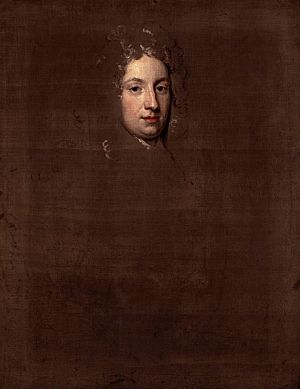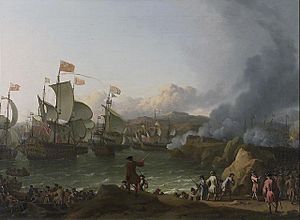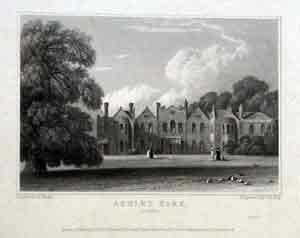Richard Boyle, 2nd Viscount Shannon facts for kids
Quick facts for kids
The Viscount Shannon
|
|
|---|---|

Unfinished portrait by Sir Godfrey Kneller (circa 1710)
|
|
| Born | 1675 Westminster, England |
| Died | 20 December 1740 (aged 65) Ashley Park, Walton-on-Thames |
| Buried |
St Mary's Parish Church, Walton-on-Thames
|
| Allegiance | |
| Service/ |
|
| Years of service | 1690–1740 |
| Rank | Field Marshal |
| Commands held | Commander-in-Chief, Ireland |
| Battles/wars | Williamite War in Ireland Nine Years' War War of the Spanish Succession |
Richard Boyle, 2nd Viscount Shannon (born 1675, died 1740) was an important British Army officer and a statesman. He rose through the ranks to become a Field Marshal, which is a very high military rank.
Richard Boyle fought in several major wars. He was a junior officer in the Williamite War in Ireland and the Nine Years' War. Later, he led soldiers during the War of the Spanish Succession. He was known for his bravery and leadership in battles like the storming of Vigo. He also served as the top military commander in Ireland for many years.
Contents
Military Career and Achievements
Early Military Life

Richard Boyle was born in 1675. He was the son of Richard Boyle and Elizabeth Ponsonby. He went to the University of Oxford for his education.
He began his military journey as a volunteer in July 1690. This was during the Williamite War in Ireland, where he fought at the Battle of the Boyne. He also took part in the Battle of Landen in July 1693, during the Nine Years' War. In this battle, he was injured and became a prisoner of war for a short time.
In 1694, he officially joined the army as a junior officer. He was promoted to major in the Army in 1697.
Rising Through the Ranks
In 1699, Richard Boyle became the 2nd Viscount Shannon. This was a title he inherited from his grandfather. In February 1702, he became a colonel. He then led a group of elite soldiers called grenadiers. They were part of the attack on Vigo in October 1702. This was a key event in the War of the Spanish Succession.
During the attack on Vigo, the entire French fleet was captured or destroyed. The Spanish ships were also taken or ruined. For his excellent actions at Vigo, Boyle was chosen to deliver the news to Queen Anne. She rewarded him with a large sum of money.
He was promoted to brigadier-general in 1704. The next year, he helped with a successful attack on Barcelona. Again, he was sent to tell Queen Anne the good news and received another reward. In 1708, he became a major-general. He also became a Member of Parliament (MP) for Arundel. He supported the Whig political party.
In 1709, he was promoted to lieutenant general. He also became Deputy Governor of Dover Castle. He was later given command of a secret mission to attack New France in 1710, but this plan did not happen.
Later Military and Political Roles
In January 1715, Boyle became a colonel of a new regiment of foot soldiers. He also continued his work as a Member of Parliament. In 1716, he joined the army staff in Ireland.
Richard Boyle became the Commander-in-Chief, Ireland in 1720. He held this important position for the rest of his life. This meant he was the head of the army in Ireland. He also became a member of the Privy Council of Ireland in 1721. This council advised the King.
He was honored by the City of Cork in 1722. He continued to serve in Parliament. In March 1727, he became a colonel of the 4th Troop of Horse Guards. He was promoted to general of horse in 1735.
In 1737, he became the Governor of Portsmouth. His final promotion came on July 17, 1739, when he became a field marshal. This is the highest rank in the British Army.
Richard Boyle died at his home, Ashley Park in Walton-on-Thames, on December 20, 1740. He was buried at St Mary's Parish Church in Walton-on-Thames. There is a special monument there to remember him.
Family Life
Richard Boyle married Mary Sackville on June 6, 1704. She was the daughter of the Earl of Dorset. She passed away twelve years later, and they did not have any children.
In January 1720, Boyle married again to Grace Senhouse. They had one child together, a daughter named Grace Sackville, Countess of Middlesex.
 | Toni Morrison |
 | Barack Obama |
 | Martin Luther King Jr. |
 | Ralph Bunche |


